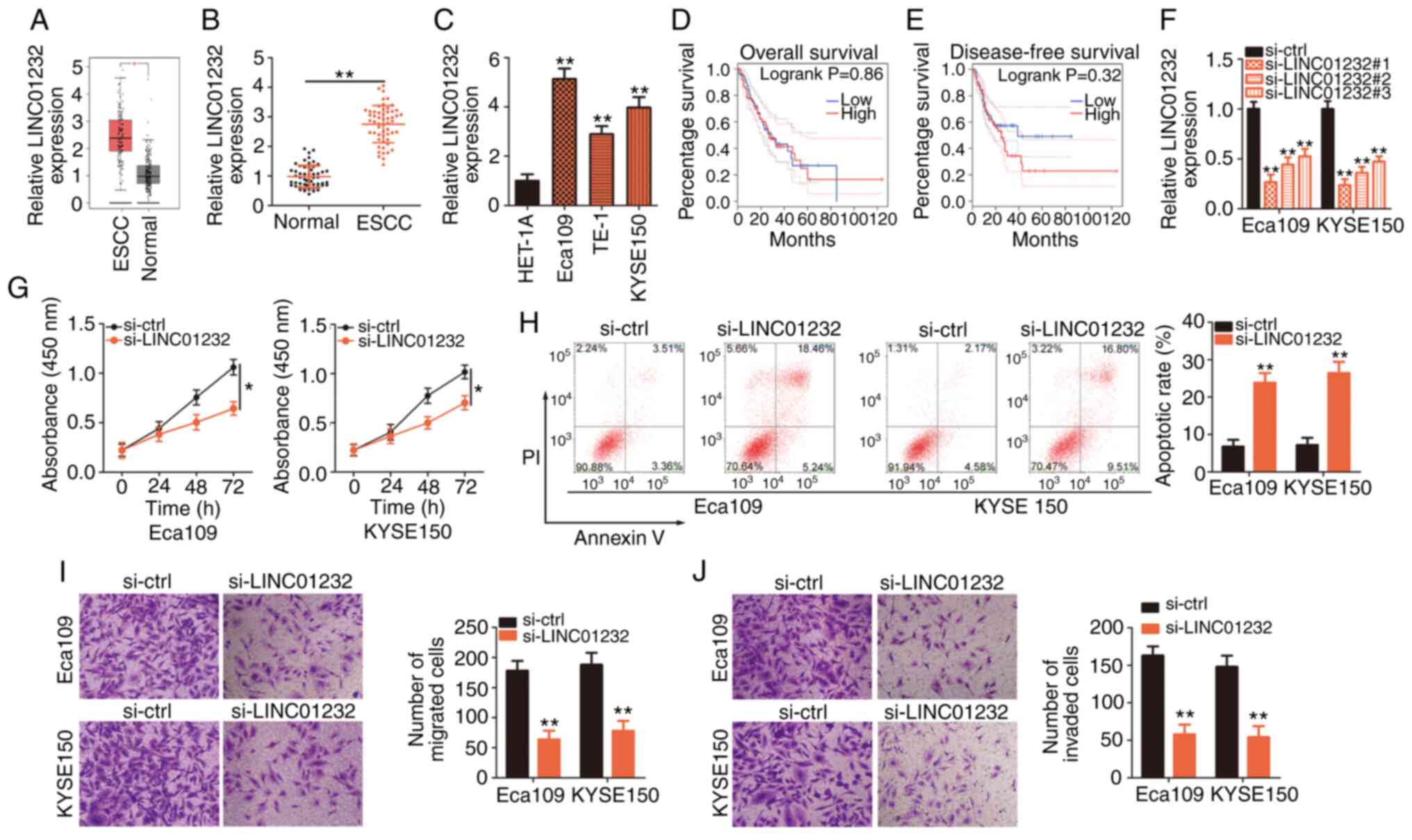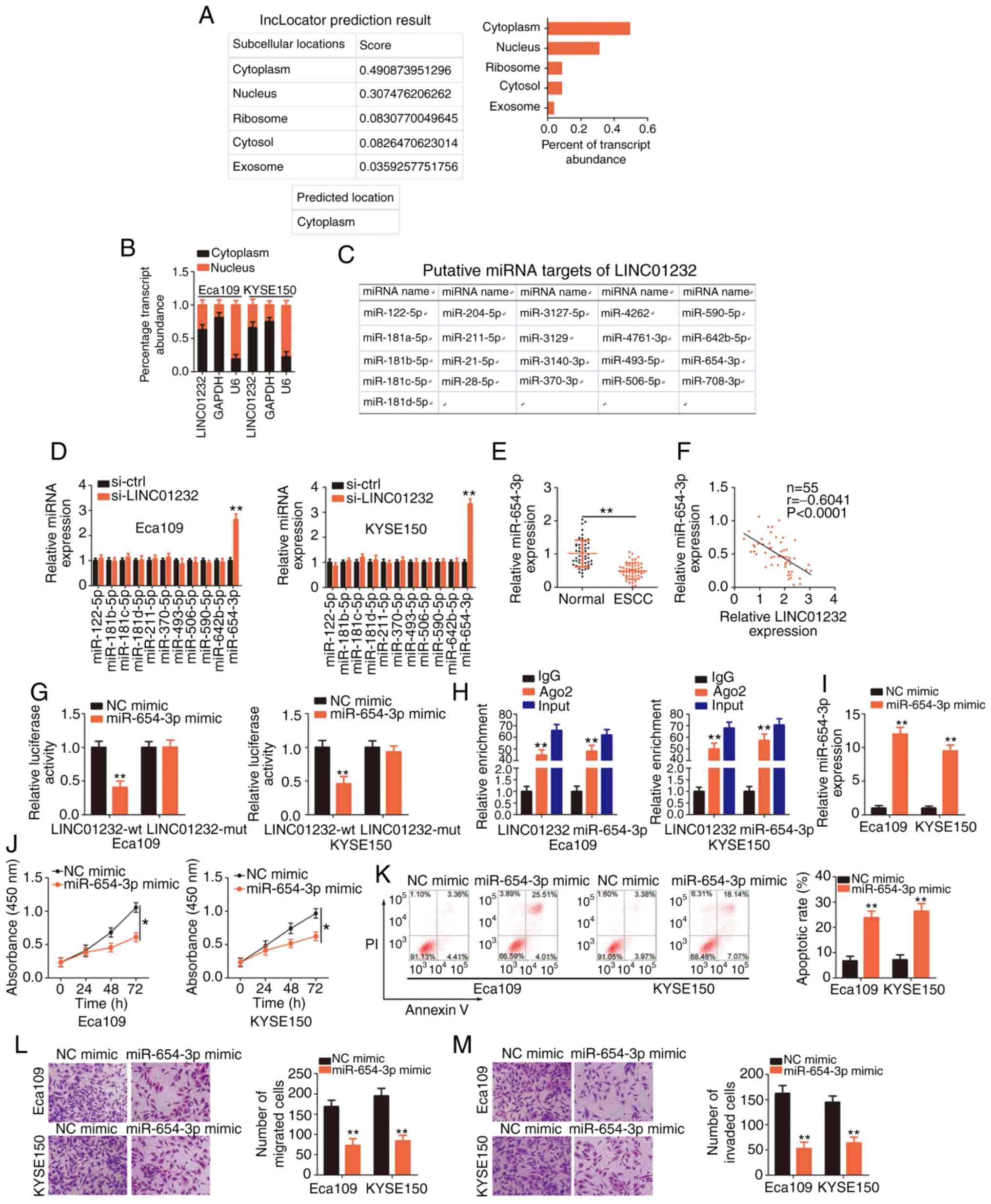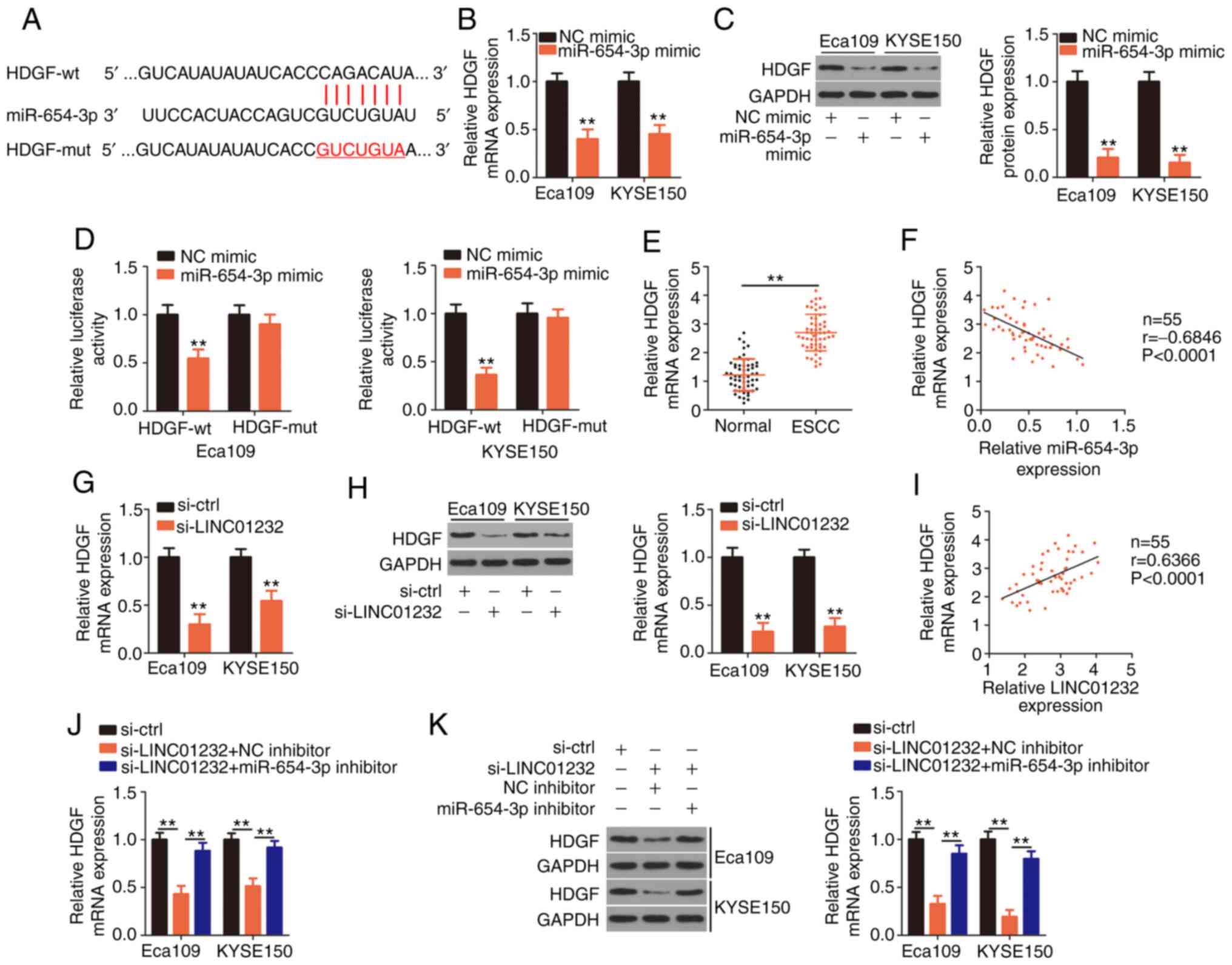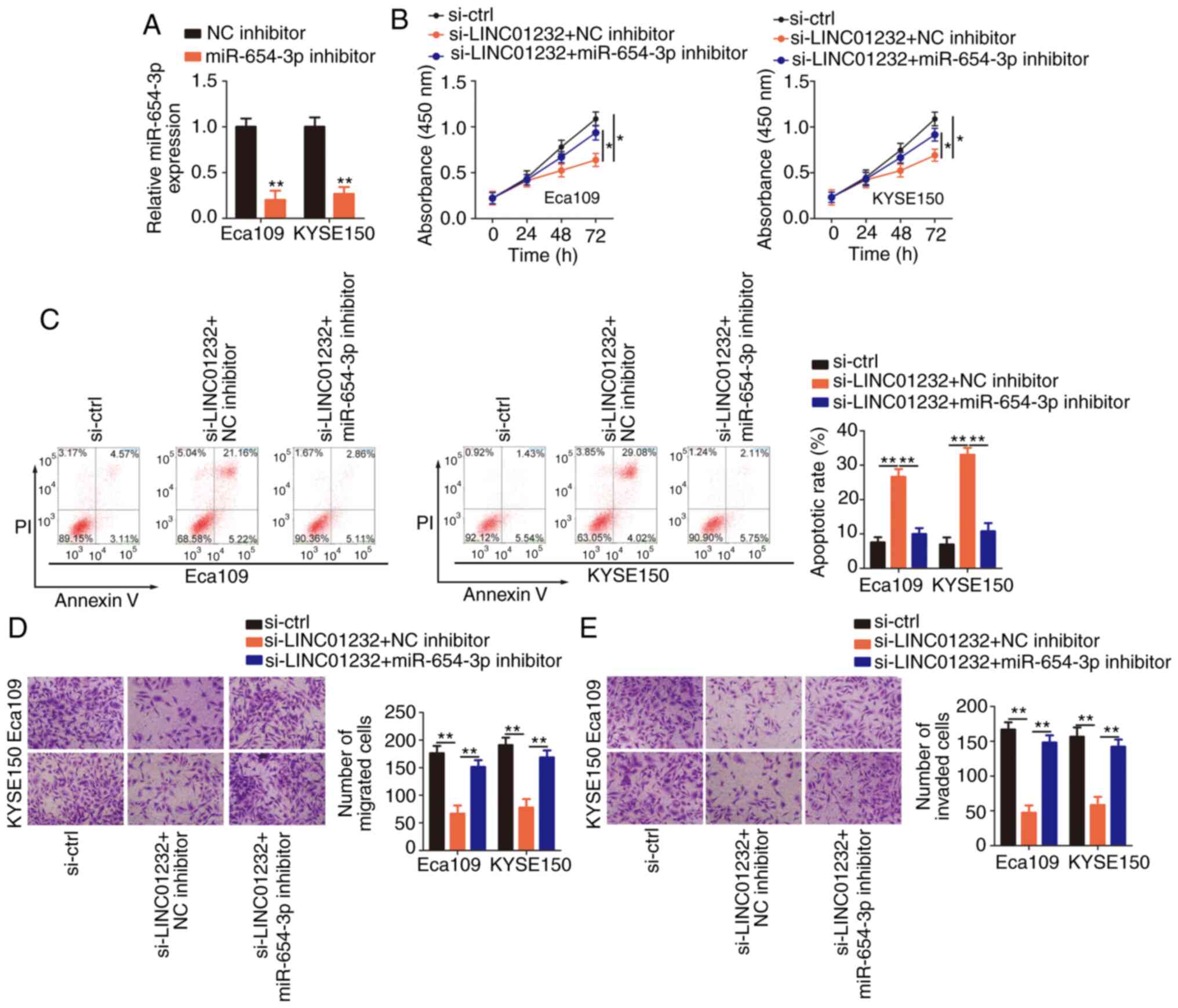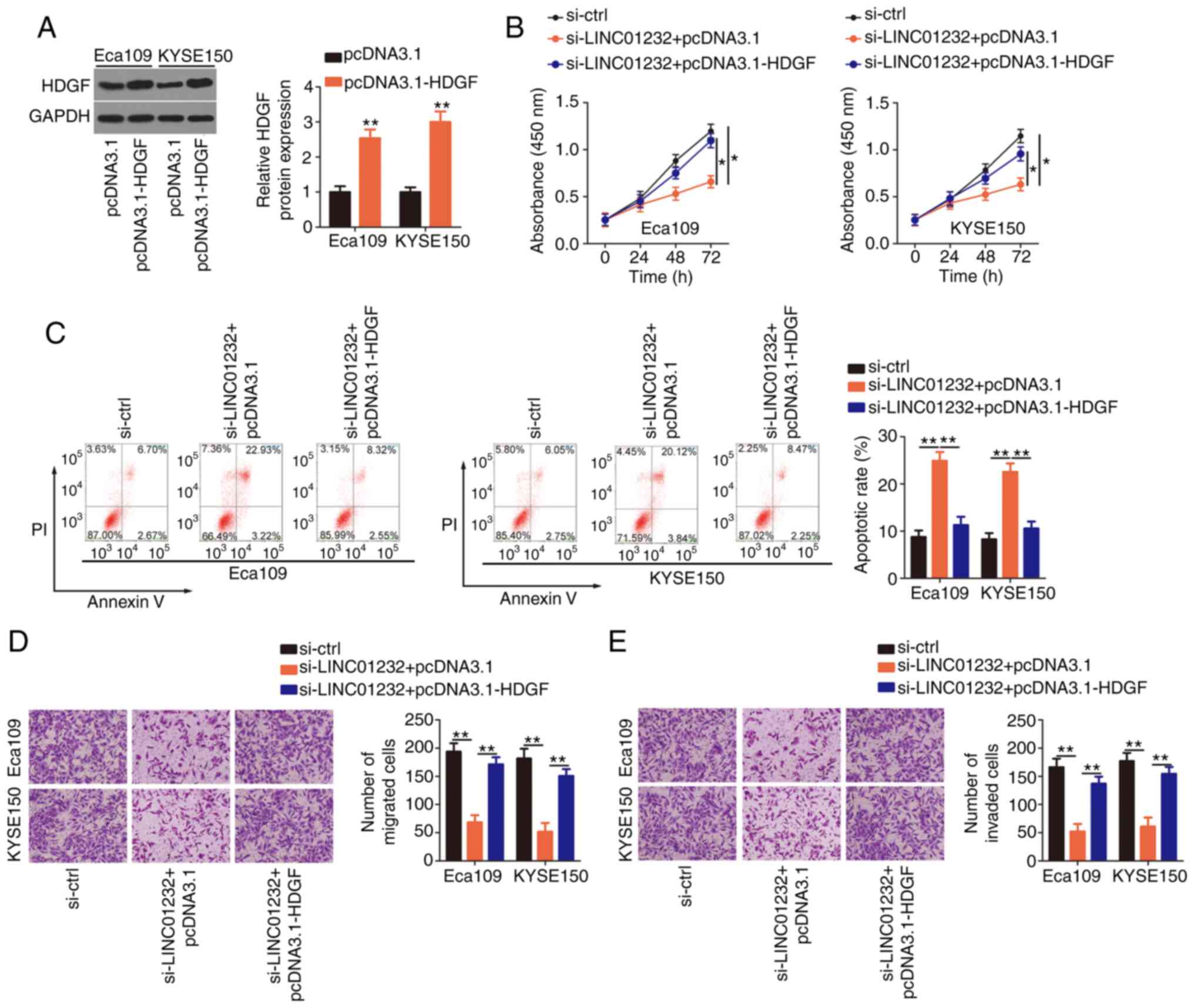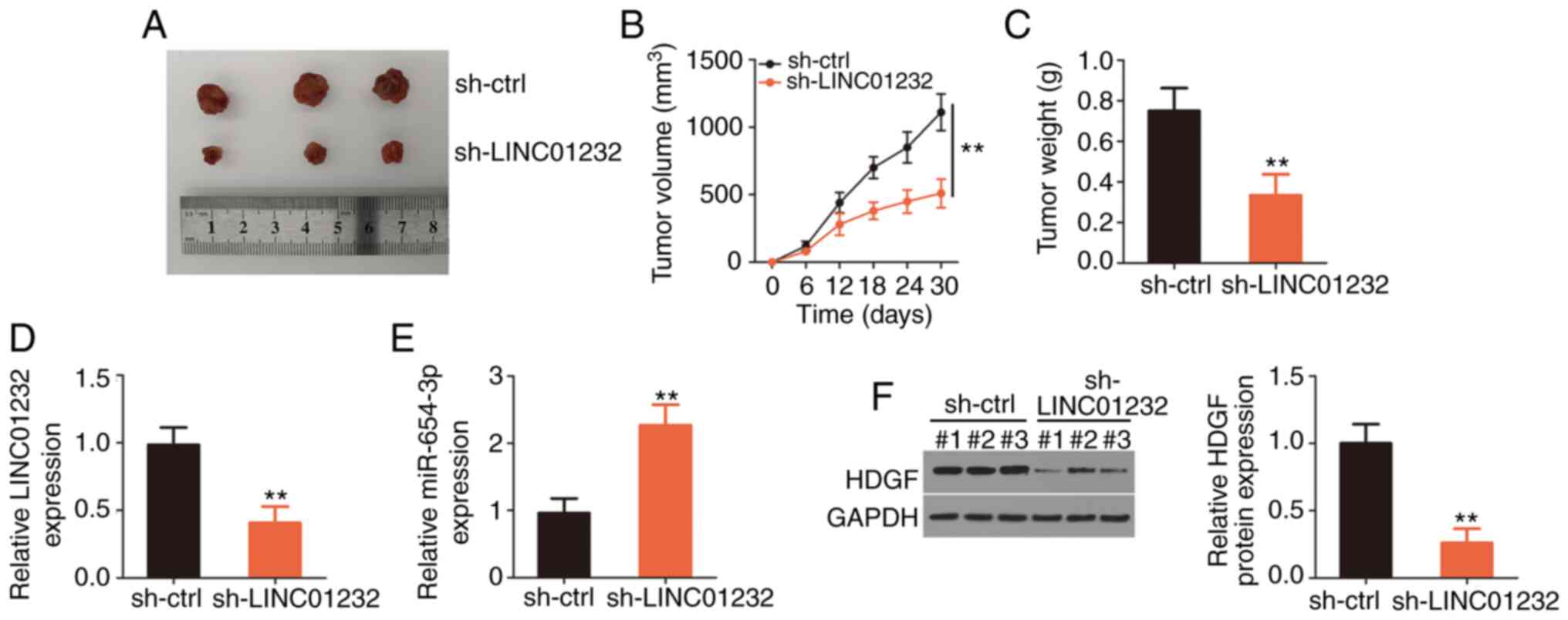|
1
|
Bray F, Ferlay J, Soerjomataram I, Siegel
RL, Torre LA and Jemal A: Global cancer statistics 2018: GLOBOCAN
estimates of incidence and mortality worldwide for 36 cancers in
185 countries. CA Cancer J Clin. 68:394–424. 2018. View Article : Google Scholar : PubMed/NCBI
|
|
2
|
Torre LA, Bray F, Siegel RL, Ferlay J,
Lortet-Tieulent J and Jemal A: Global cancer statistics, 2012. CA
Cancer J Clin. 65:87–108. 2015. View Article : Google Scholar : PubMed/NCBI
|
|
3
|
Funakawa K, Uto H, Sasaki F, Nasu Y,
Mawatari S, Arima S, Nakazawa J, Taguchi H, Hashimoto S, Kanmura S,
et al: Effect of endoscopic submucosal dissection for superficial
esophageal neoplasms and risk factors for postoperative stricture.
Medicine (Baltimore). 94:e3732015. View Article : Google Scholar
|
|
4
|
Smyth EC, Lagergren J, Fitzgerald RC,
Lordick F, Shah MA, Lagergren P and Cunningham D: Oesophageal
cancer. Nat Rev Dis Primers. 3:170482017. View Article : Google Scholar : PubMed/NCBI
|
|
5
|
Enzinger PC and Mayer RJ: Esophageal
cancer. N Engl J Med. 349:2241–2252. 2003. View Article : Google Scholar : PubMed/NCBI
|
|
6
|
Zhang Y: Epidemiology of esophageal
cancer. World J Gastroenterol. 19:5598–5606. 2013. View Article : Google Scholar : PubMed/NCBI
|
|
7
|
Song Y, Li L, Ou Y, Gao Z, Li E, Li X,
Zhang W, Wang J, Xu L, Zhou Y, et al: Identification of genomic
alterations in oesophageal squamous cell cancer. Nature. 509:91–95.
2014. View Article : Google Scholar : PubMed/NCBI
|
|
8
|
Bach DH and Lee SK: Long noncoding RNAs in
cancer cells. Cancer Lett. 419:152–166. 2018. View Article : Google Scholar : PubMed/NCBI
|
|
9
|
Cao W, Liu JN, Liu Z, Wang X, Han ZG, Ji
T, Chen WT and Zou X: A three-lncRNA signature derived from the
Atlas of ncRNA in cancer (TANRIC) database predicts the survival of
patients with head and neck squamous cell carcinoma. Oral Oncol.
65:94–101. 2017. View Article : Google Scholar : PubMed/NCBI
|
|
10
|
Sarfi M, Abbastabar M and Khalili E: Long
noncoding RNAs biomarker-based cancer assessment. J Cell Physiol.
234:16971–16986. 2019. View Article : Google Scholar : PubMed/NCBI
|
|
11
|
Sun Y and Ma L: New insights into long
non-coding RNA MALAT1 in cancer and metastasis. Cancers (Basel).
11:2162019. View Article : Google Scholar
|
|
12
|
Ponting CP, Oliver PL and Reik W:
Evolution and functions of long noncoding RNAs. Cell. 136:629–641.
2009. View Article : Google Scholar : PubMed/NCBI
|
|
13
|
Javed Z, Khan K, Sadia H, Raza S, Salehi
B, Sharifi-Rad J and Cho WC: LncRNA and Wnt signaling in colorectal
cancer. Cancer Cell Int. 20:3262020. View Article : Google Scholar
|
|
14
|
Tang WW, Wu Q, Li SQ, Tong YS, Liu ZH,
Yang TX, Xu Y and Cao XF: Implication of lncRNAs in pathogenesis of
esophageal cancer. Onco Targets Ther. 8:3219–3226. 2015. View Article : Google Scholar : PubMed/NCBI
|
|
15
|
Luo F, Wen Y, Zhou H and Li Z: Roles of
long non-coding RNAs in cervical cancer. Life Sci. 256:1179812020.
View Article : Google Scholar : PubMed/NCBI
|
|
16
|
Du F, Guo T and Cao C: Restoration of
UPK1A-AS1 expression suppresses cell proliferation, migration, and
invasion in esophageal squamous cell carcinoma cells partially by
sponging microRNA-1248. Cancer Manag Res. 12:2653–2662. 2020.
View Article : Google Scholar : PubMed/NCBI
|
|
17
|
Ren P, Zhang H, Chang L, Hong XD and Xing
L: LncRNA NR2F1-AS1 promotes proliferation and metastasis of ESCC
cells via regulating EMT. Eur Rev Med Pharmacol Sci. 24:3686–3693.
2020.PubMed/NCBI
|
|
18
|
Liang X, Wu Z, Shen S, Niu Y, Guo Y, Liang
J and Guo W: LINC01980 facilitates esophageal squamous cell
carcinoma progression via regulation of miR-190a-5p/MYO5A pathway.
Arch Biochem Biophys. 686:1083712020. View Article : Google Scholar : PubMed/NCBI
|
|
19
|
Bartel DP: MicroRNAs: Target recognition
and regulatory functions. Cell. 136:215–233. 2009. View Article : Google Scholar : PubMed/NCBI
|
|
20
|
Shukla GC, Singh J and Barik S: MicroRNAs:
Processing, maturation, target recognition and regulatory
functions. Mol Cell Pharmacol. 3:83–92. 2011.PubMed/NCBI
|
|
21
|
Sharma P and Sharma R: miRNA-mRNA
crosstalk in esophageal cancer: From diagnosis to therapy. Crit Rev
Oncol Hematol. 96:449–462. 2015. View Article : Google Scholar : PubMed/NCBI
|
|
22
|
Du G, Zhou J, Cheng L, Ma X, Gui Y and Tan
B: High expression of miR-206 predicts adverse outcomes: A
potential therapeutic target for esophageal cancer. Comb Chem High
Throughput Screen. 22:599–611. 2019. View Article : Google Scholar : PubMed/NCBI
|
|
23
|
Wang W, Fu S, Lin X, Zheng J, Pu J, Gu Y,
Deng W, Liu Y, He Z, Liang W and Wang C: miR-92b-3p functions as a
key gene in esophageal squamous cell cancer as determined by
co-expression analysis. Onco Targets Ther. 12:8339–8353. 2019.
View Article : Google Scholar : PubMed/NCBI
|
|
24
|
Hu X, Wang M, Cao L, Cong L, Gao Y, Lu J,
Feng J, Shen B and Liu D: miR-4319 suppresses the growth of
esophageal squamous cell carcinoma via targeting NLRC5. Curr Mol
Pharmacol. 13:144–149. 2020. View Article : Google Scholar
|
|
25
|
Ye Y, Shen A and Liu A: Long non-coding
RNA H19 and cancer: A competing endogenous RNA. Bull Cancer.
106:1152–1159. 2019. View Article : Google Scholar : PubMed/NCBI
|
|
26
|
Li Q, Lei C, Lu C, Wang J, Gao M and Gao
W: LINC01232 exerts oncogenic activities in pancreatic
adenocarcinoma via regulation of TM9SF2. Cell Death Dis.
10:6982019. View Article : Google Scholar : PubMed/NCBI
|
|
27
|
Livak KJ and Schmittgen TD: Analysis of
relative gene expression data using real-time quantitative PCR and
the 2(-Delta Delta C(T)) method. Methods. 25:402–408. 2001.
View Article : Google Scholar
|
|
28
|
Bayoumi AS, Sayed A, Broskova Z, Teoh JP,
Wilson J, Su H, Tang YL and Kim IM: Crosstalk between long
noncoding RNAs and microRNAs in health and disease. Int J Mol Sci.
17:3562016. View Article : Google Scholar : PubMed/NCBI
|
|
29
|
Abdollahzadeh R, Daraei A, Mansoori Y,
Sepahvand M, Amoli MM and Tavakkoly-Bazzaz J: Competing endogenous
RNA (ceRNA) cross talk and language in ceRNA regulatory networks: A
new look at hallmarks of breast cancer. J Cell Physiol.
234:10080–10100. 2019. View Article : Google Scholar
|
|
30
|
Dong BS, Shi MJ, Su SB and Zhang H:
Insight into long noncoding competing endogenous RNA networks in
hepatic fibrosis: The potential implications for mechanism and
therapy. Gene. 687:255–260. 2019. View Article : Google Scholar
|
|
31
|
Xiang Z, Dong X, Sun Q, Li X and Yan B:
Clinical significance of up-regulated miR-181a in prognosis and
progression of esophageal cancer. Acta Biochim Biophys Sin
(Shanghai). 46:1007–1010. 2014. View Article : Google Scholar
|
|
32
|
Xia Y, Wang Y, Wang Q, Ghaffar M, Wang Y,
Sheng W and Zhang F: Increased miR-203-3p and reduced miR-21-5p
synergistically inhibit proliferation, migration, and invasion in
esophageal cancer cells. Anticancer Drugs. 30:38–45. 2019.
View Article : Google Scholar
|
|
33
|
Yang H, Su H, Hu N, Wang C, Wang L, Giffen
C, Goldstein AM, Lee MP and Taylor PR: Integrated analysis of
genome-wide miRNAs and targeted gene expression in esophageal
squa-mous cell carcinoma (ESCC) and relation to prognosis. BMC
Cancer. 20:3882020. View Article : Google Scholar
|
|
34
|
Chen L, Jin Y, Wang L, Sun F, Yang X, Shi
M, Zhan C, Shi Y and Wang Q: Identification of reference genes and
miRNAs for qRT-PCR in human esophageal squamous cell carcinoma. Med
Oncol. 34:22017. View Article : Google Scholar
|
|
35
|
Matsuyama A, Inoue H, Shibuta K, Tanaka Y,
Barnard GF, Sugimachi K and Mori M: Hepatoma-derived growth factor
is associated with reduced sensitivity to irradiation in esophageal
cancer. Cancer Res. 61:5714–5717. 2001.PubMed/NCBI
|
|
36
|
Yamamoto S, Tomita Y, Hoshida Y, Morii E,
Yasuda T, Doki Y, Aozasa K, Uyama H, Nakamura H and Monden M:
Expression level of hepatoma-derived growth factor correlates with
tumor recurrence of esophageal carcinoma. Ann Surg Oncol.
14:2141–2149. 2007. View Article : Google Scholar : PubMed/NCBI
|
|
37
|
Bao CH, Wang XT, Ma W, Wang NN, Nesa EU,
Wang JB, Wang C, Jia YB, Wang K, Tian H and Cheng YF: Irradiated
fibroblasts promote epithelial-mesenchymal transition and HDGF
expression of esophageal squamous cell carcinoma. Biochem Biophys
Res Commun. 458:441–447. 2015. View Article : Google Scholar : PubMed/NCBI
|
|
38
|
Huang Z, Zhou JK, Peng Y, He W and Huang
C: The role of long noncoding RNAs in hepatocellular carcinoma. Mol
Cancer. 19:772020. View Article : Google Scholar : PubMed/NCBI
|
|
39
|
Mozdarani H, Ezzatizadeh V and Rahbar
Parvaneh R: The emerging role of the long non-coding RNA HOTAIR in
breast cancer development and treatment. J Transl Med. 18:1522020.
View Article : Google Scholar : PubMed/NCBI
|
|
40
|
Khajehdehi M, Khalaj-Kondori M, Ghasemi T,
Jahanghiri B and Damaghi M: Long noncoding RNAs in gastrointestinal
cancer: Tumor suppression versus tumor promotion. Dig Dis Sci Mar.
17:2020.Epub ahead of print. View Article : Google Scholar
|
|
41
|
Feng Q, Zhang H, Yao D, Chen WD and Wang
YD: Emerging role of non-coding RNAs in esophageal squamous cell
carcinoma. Int J Mol Sci. 21:2582019. View Article : Google Scholar
|
|
42
|
Talebi A, Masoodi M, Mirzaei A,
Mehrad-Majd H, Azizpour M and Akbari A: Biological and clinical
relevance of metastasis-associated long noncoding RNAs in
esophageal squamous cell carcinoma: A systematic review. J Cell
Physiol. 235:848–868. 2020. View Article : Google Scholar
|
|
43
|
Wang JJ, Huang YQ, Song W, Li YF, Wang H,
Wang WJ and Huang M: Comprehensive analysis of the lncRNA
associated competing endogenous RNA network in breast cancer. Oncol
Rep. 42:2572–2582. 2019.PubMed/NCBI
|
|
44
|
Pan H, Guo C, Pan J, Guo D, Song S, Zhou Y
and Xu D: Construction of a competitive endogenous RNA network and
identification of potential regulatory axis in gastric cancer.
Front Oncol. 9:9122019. View Article : Google Scholar : PubMed/NCBI
|
|
45
|
Liang W and Sun F: Identification of
pivotal lncRNAs in papillary thyroid cancer using lncRNA-mRNA-miRNA
ceRNA network analysis. PeerJ. 7:e74412019. View Article : Google Scholar : PubMed/NCBI
|
|
46
|
Yang J, Zhang Z, Chen S, Dou W, Xie R and
Gao J: miR-654-3p predicts the prognosis of hepatocellular
carcinoma and inhibits the proliferation, migration, and invasion
of cancer cells. Cancer Biomark. 28:73–79. 2020. View Article : Google Scholar : PubMed/NCBI
|
|
47
|
Li P, Cai JX, Han F, Wang J, Zhou JJ, Shen
KW and Wang LH: Expression and significance of miR-654-5p and
miR-376b-3p in patients with colon cancer. World J Gastrointest
Oncol. 12:492–502. 2020. View Article : Google Scholar : PubMed/NCBI
|















